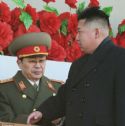North Korea confirmed on Wednesday it is holding an accounting professor, bringing to three the number of Americans held in its prisons as international tensions escalate.
It was widely known that Kim Sang Dok, who also goes by the name Tony Kim, was nabbed at Pyongyang International Airport on April 22, but state-controlled media now has confirmed the development. The Korean Central News Agency said he is suspected of "acts of hostility aimed at overthrowing the country."
The 58-year-old captive joins University of Virginia student Otto Warmbier and businessman Kim Dong Chul in the Hermit Kingdom's infamous gulags as the world continues to pressure North Korea over its rogue nuclear weapons program.
In the past, North Korea has generally quickly released any American citizens it detained – waiting at most for a U.S. official or statesman to come and to personally bail out detainees. But that appears to be changing.
Early in the dictatorship of Kim Jong Un, North Korea called on its people to rally behind him and protect him as "human shields." But with the U.S. leading a growing international coalition determined to counter North Korea's nuclear and missile testing as well as threats against neighbors and western countries, the Americans could be bargaining chips at best and human shields at worst, according to experts.
Wednesday's KCNA dispatch said authorities were detaining Kim Sang Dok and are conducting a detailed investigation into his alleged crime. The detention comes amid rising tensions between North Korea and the U.S. related to the reclusive regimes nuclear weapons program.
Kim was invited to Pyongyang University of Science and Technology to teach, KCNA reported, and the school's chancellor and the Swedish Embassy in Pyongyang earlier gave the information about Kim's detention but didn't provide a reason for his arrest.
Both the professor and his wife reportedly were trying to leave the country. His wife has since returned to the U.S., a university spokesman told Reuters, adding: "We certainly hope for a positive resolution as soon as possible."
The U.S. State Department last month did not comment, "due to privacy considerations."
Warmbier, 21, was detained on Jan. 2, 2016, at Pyongyang International Airport, while visiting the country as a tourist with Young Pioneer Tour. He was charged with stealing a political sign from a staff-only floor in the Yanggakdo International Hotel in Pyongyang and committing "crimes against the state." He was given a one-hour trial last March at which the government presented fingerprints, CCTV footage and pictures of a political banner to make its case against the American student.
"I beg that you see how I am only human," Warmbier said at his trial. "And how I have made the biggest mistake of my life."
Despite his pleas, the college student was sentenced to 15 years of hard labor. In a post-trial video released to the world, Warmbier, under obvious duress, praised his captors for his treatment and for handling of the case "fair and square."
Julia Mason, a State Department spokeswoman, told the Cincinnati Enquirer that the U.S. government "continues to actively work to secure his earliest possible release." Mason added, however, that U.S. emissaries in North Korea have not been able to visit Warmbier for more than a year.
"A representative from the Swedish Embassy ... last visited Mr. Warmbier on March 2, 2016," Mason said. "We are in regular, close coordination with representatives of the Embassy of Sweden." The plight of the Korean-American businessman is probably the most hazy case of all the Americans being held in North Korea.
A former resident of Virginia, Kim Dong Chul was living in China with his wife and operating a business in a special economic zone of North Korea when he was detained in October 2015 while in the city of Rason. His detainment was not made public until North Korean officials introduced him to a visiting news crew and allowed him to be interviewed through an interpreter.
It was later revealed that Kim had been detained on suspicion of engaging in spying and stealing state secrets. He was sentenced to 10 years in prison with hard labor after a brief trial in Pyongyang. North Korea's Supreme Court found Kim guilty of espionage and subversion under Articles 60 and 64 of the North's criminal code.
When he was paraded before the media in Pyongyang last March, Kim said he had collaborated with and spied for South Korean intelligence authorities in a plot to bring down the North's leadership and had tried to spread religion among North Koreans before his arrest.
South Korea's National Intelligence Service, the country's main spy agency, has said Kim's case wasn't related to the organization in any way.
May 3, 2017
North Korea confirms third American held as tensions rise
Date
May 3, 2017
Title
Kim’s human shields: North Korea confirms third American held as tensions rise,
Fox News
Original Source

